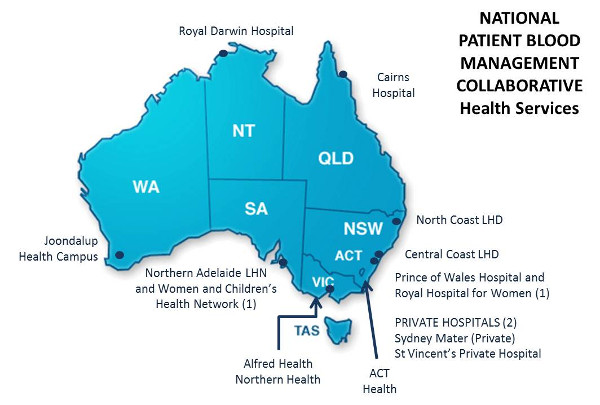Perioperative anaemia and iron deficiency cause significant waste in the health system. Making surgery safer and eliminating this waste are the aims of the National Patient Blood Management Collaborative. Several North Coast hospitals are part of this collaborative.
Dr Chris Lowry, Senior Staff Specialist, Department of Anaesthesia and Perioperative Medicine Lismore Base Hospital outlines the program.
When referring patients for major elective surgery, it is useful to stop and consider how they may be “optimised” for their procedure. As well as the usual considerations about smoking cessation and exercise programs, it is a good time to screen for anaemia and iron deficiency.
Anaemia, even mild anaemia, is independently associated with postoperative morbidity and mortality. This includes pulmonary, thrombo-embolic and wound complications. This relationship is true even without the added increased risk of perioperative blood transfusion. Anaemia should be regarded as a relative contraindication to major elective surgery.
Anaemia is relatively common in the population presenting for joint replacement surgery, major bowel surgery and gynaecological surgery. Lismore Base Hospital, St Vincent’s Hospital and North Coast PHN are part of a National Patient Blood Management Collaborative, targeting this problem. The aim is to remove the barriers to anaemia recognition and treatment prior to elective surgery.

Screening
Detection and treatment of anaemia before surgery is the first step or “pillar’ in the process of patient blood management. Screening investigations should include
- FBC
- Iron studies, including serum ferritin
- CRP
- Renal function
Anaemia is relatively easy to treat with iron supplementation and is less risky and costly than blood transfusion. Even patients with iron deficiency without overt anaemia, should benefit from preoperative iron. If surgery is unable to be deferred for iron deficient patients, or if oral iron is poorly tolerated, intravenous iron should be considered. Functional iron deficiency, where chronic disease contributes to poor oral absorption, has been shown to respond to intravenous iron. A new form of intravenous iron, Ferinject (oral ferric carboxymaltose), can be administered in suitably equipped GPs rooms.
In the future you may receive a letter from the hospital about preoperative blood management and the patient may ask you as well as they will be receiving a “Fit for surgery” pamphlet.
As it takes time to investigate, manage and assess response to iron therapy, the earlier this process is started the better. GPs are in the box seat to manage this and requesting the appropriate tests should be considered at the time of surgical referral for the at risk conditions. This is also a good time to make sure the medical health summary is up to date, as it is very useful to us in the Preadmission Clinic.
The National Prescribing Service (NPS) algorithms for managing preoperative iron deficiency are listed below.
References
- Munoz M, Gomez-Ramirez S, et al. ‘Fit to fly’: overcoming barriers to preoperative haemoglobin optimization in surgical patients. Br. J. Anaesth. (2015) 115 (1): 15-24. Abstract available online at:
- Minck S, Robinson K, Saxon B, Spigiel T, Thomson A. Patient blood management - the GP's guide. Aust Fam Physician. 2013 May;42(5):291-7.
- Musallam KM, Tamim HM, Richards T, et al. Preoperative anaemia and postoperative outcomes in non-cardiac surgery: a retrospective cohort study. Lancet 2011; 378:1396-1407.
- PBM flow chart for patients undergoing major surgery.
- Resources for general practitioners managing patients undergoing planned surgery
- NPS Flowchart (No inflammatory influence)
- NPS Flowchart (Inflammatory influence)
















